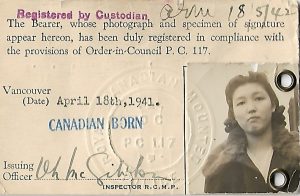Broadly speaking, Grandma’s experience seems to line up with many other accounts that I’ve read over the course of my research. She’s 94 years old now, meaning she would have been a teenager when she was interred. She lived in the Vancouver area and had to be pulled out of high school to go to the camps. She was not held or trained at Hastings Park, but many of her friends were. In fact, she hadn’t received much of any training at all when she began teaching kindergarten, insisting that “we just played games, anyone could have done it”, which is a sentiment that leaves us with a lot to unpack. She needed no special training because there was no official curriculum that she was directed to follow. Furthermore, she only came into the job when two trained teachers were transferred out of the camp, and a grade ten girl with no background in teaching was determined to be good enough. Anyone could have done it, because they didn’t really care who did it. As such, during the interview, she often had to be guided back to discussing teaching because she didn’t seem to understand why I was asking her about her kindergarten class when in her mind it didn’t seem to be a terribly important part of the internment experience. For her it seemed that teaching kindergarten was secondary to her afternoon job as a seamstress. Sure, she played with some kids in the morning, but then she went and did her important job that required a proper skill, so why did I care so much about the time playing with kids?

Grandma’s Japanese registration card. She told me she looks upset in this photo because she was sick at the time, but I don’t buy that. I think she wants to punch the photographer in the nose.